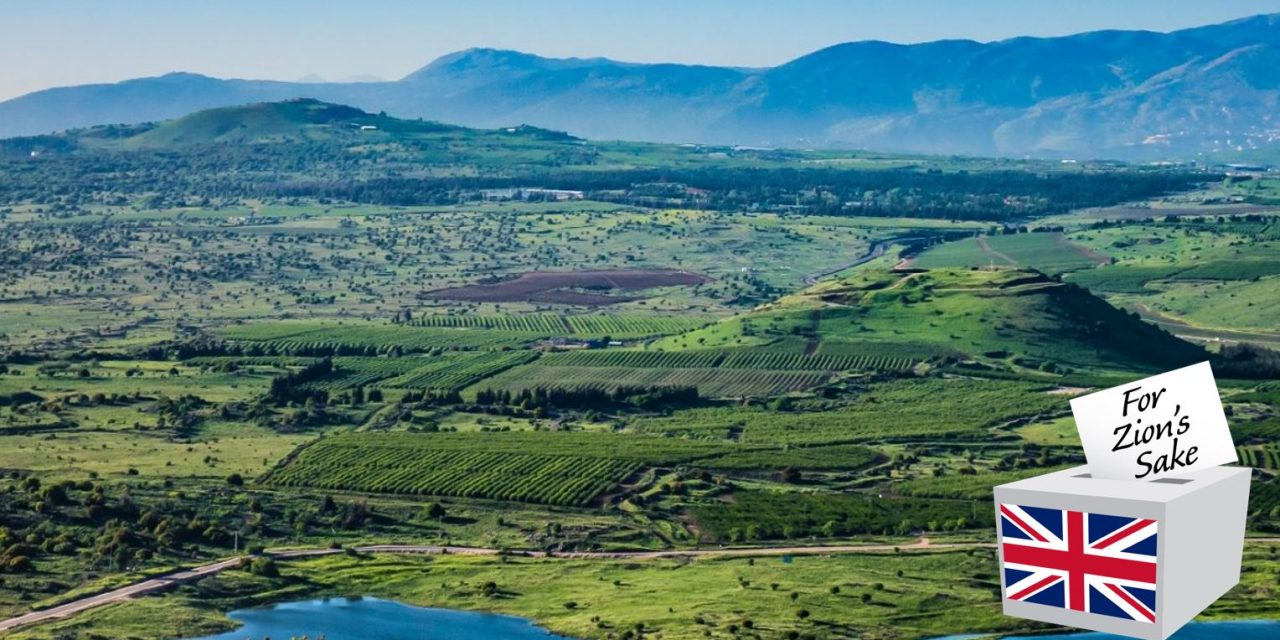And on the other side of the Jordan, by Jericho eastward, they assigned Bezer in the wilderness on the plain, from the tribe of Reuben, Ramoth in Gilead, from the tribe of Gad, and Golan in Bashan, from the tribe of Manasseh. Joshua 20:8
As part of CUFI’s “For Zion’s Sake” campaign, we have listed 12 principles that we believe the new UK Government should implement, including affirming Israel’s sovereignty over the Golan Heights. The Golan Heights are a part of Israel historically, Biblically and legally.
- The Golan Heights is part of the land promised by God to Abraham, Isaac and Jacob.
- It provides Israel with crucial military advantages to defend itself from any future attack.
- Israel’s claim to the Golan Heights is not only legal under international law, but it is a moral imperative.
According to Scripture
Archaeology reaffirms an indisputable Jewish presence in the area known today as the Golan Heights going back thousands of years. From ancient synagogues to Jewish towns, this elevated land with its hills, mountains and plateau was part of the ancestral home of the Jewish people, promised by God as an everlasting possession for the descendants of Abraham, Isaac and Jacob. (Deut 4:43; Josh 20:8; 1 Chron 6:71)
A Jewish presence in the Golan continued during the time of Jesus and for hundreds of years later until Muslim Arab armies conquered the region in 636 AD, violently adding it to the first Caliphate and severing the more than 1,600 years of continuous Jewish residence.
Strategically important
The Golan Heights were used in June 1948 by Syrian forces who invaded Israel when Arab states launched an attack in objection to the creation of the State of Israel.
The territory was used again against Israel in the Six Day War of 1967 when Israel first took the territory in defence after being attacked. It was used again in the 1973 Yom Kippur War by Arab states, with Israel miraculously pushing back the onslaught against all odds.
Now under Israel’s control, Israel annexed the Golan Heights in 1981.
It continues to be a vital strategic stronghold for the Jewish state, which over the years has continued to experience the targeting of Israeli civilians living in the region.
In this context, the Golan Heights provides Israel with crucial military advantages to defend itself from any future attack.
A legal right
International law states that if a country aggressively invades and occupies another country and then annexes it, it is illegal.
However, if a country itself is attacked and in the course of defending itself takes territory that is necessary for defence, it is not only legal under international law for that country to occupy the territory, but it is a moral imperative.
Under the UN Charter, defensive action is not illegal and throughout history countries have obtained territory gained in their own defence. Yet the UN persistently condemns Israel’s possession of the Golan Heights and fails to recognise its legitimate claim.
In the past Israel has offered Syria the Golan Heights in exchange for peace, but all approaches have been rejected.
A moral imperative
If Israel accepted calls from the international community, including Britain’s Foreign Office, to return the Golan Heights, it would mean that Israel has to surrender strategic territory to people who want to attack them. The threat is no longer just Syria, which is one of the countries that attacked Israel in the Six Day War. It is now Iran whose regime has repeatedly declared it wants to wipe Israel off the map and is using Syrian territory to strengthen its arm.
It is morally wrong for Britain and any other country to expect Israel to set aside its legal rights to the Golan Heights and its obligation to protect its people and its Sovereignty.











